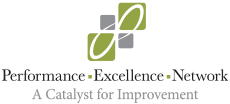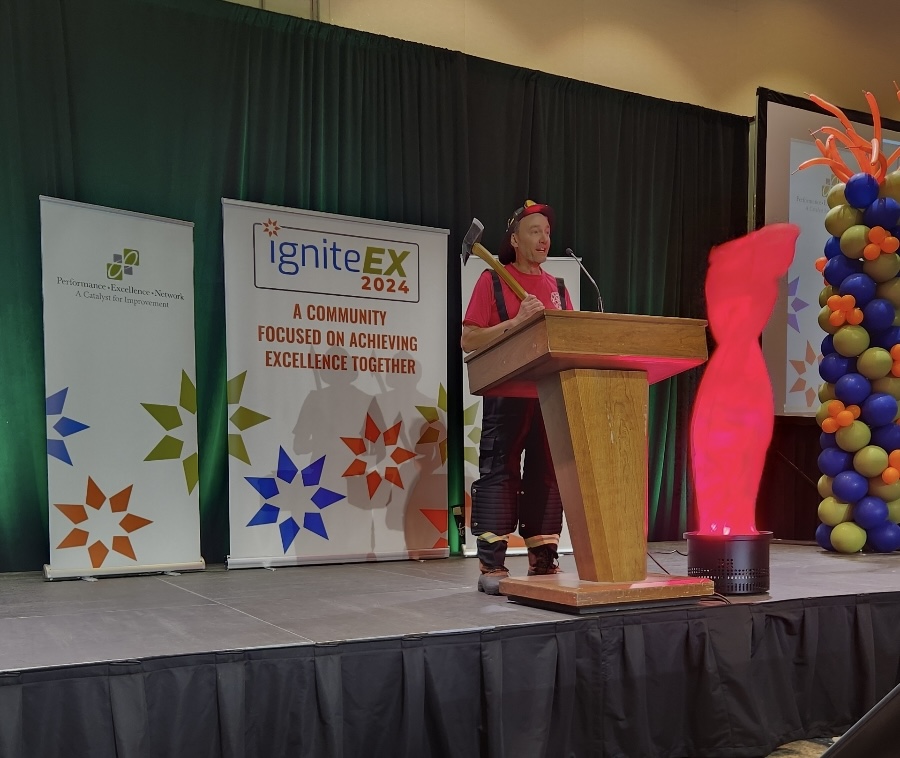
Igniting a Spark: 57 Insights from igniteEX 2024 – April 2024
April 29, 2024
It seems like it happens about this time every year (in reality, actually it does!): in partnership with our friends the Wisconsin Center for Performance Excellence and the Iowa Quality Center, PEN hosted another successful annual conference about 10 days ago, this year under the new moniker igniteEX (formerly PENworks).
As I kicked off the conference (yes, in full fireman costume, in a humorous attempt to capture the theme), I explained that the new name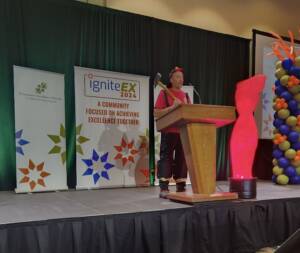 captures the essence of the event – it’s about inspiring change; sparking ideas and innovation; improving processes, people, and outcomes. And I shared that “EX” represents the beginning of so many powerful concepts – such as EXcellence, EXchanging ideas & best practices, better EXecution, more EXcitement – all of which are fundamental to the igniteEX conference EXperience!
captures the essence of the event – it’s about inspiring change; sparking ideas and innovation; improving processes, people, and outcomes. And I shared that “EX” represents the beginning of so many powerful concepts – such as EXcellence, EXchanging ideas & best practices, better EXecution, more EXcitement – all of which are fundamental to the igniteEX conference EXperience!
So while the name changed this year, many things about the conference didn’t change at all: it was the same powerful content focused on organizational and community improvement, the same powerful networking, the same powerful energy.
If you missed the conference, you have a second chance! The conference is now available on-demand – either the full conference proceedings or individual sessions. Invest in the full conference for an affordable $99 (50% off for PEN members – only $49.50), or invest in a few recordings ala carte for $19 each ($9.50 for PEN members). Click here for igniteEX-on-Demand!
But enough of the background info – how did it go? While we have our opportunities for improvement (we always try to make it better for next year), most of our members thought it hit the mark: the speakers were powerful; the networking and connections were valuable; the energy was positive, the proverbial “shot-in-the-arm” we all need as leaders and professionals. One leader from General Mills commented: “With 28 years’ marketing experience, I’ve attended or planned close to a hundred conferences and events, and igniteEX was one of the top 3 I’ve attended!”. I’d say that the event ignited a spark!
So, as has become a post-conference annual tradition, I’d like to share some highlights with all of you: after watching the entire conference a second time (admittedly on 2x speed to save a little time – funny how people sound when you crank up the pace!), I compiled 57 comments from all of our speakers – insights, nuggets, suggestions that could help us improve as leaders, teams, organizations, and communities. In the spirit of learning, here they are. Maybe take one a day for the next two months: reflect on them; share them with your team; try to find a small, specific, meaningful action you could take to improve an outcome.
Insights from Opening Keynote, Phyllis Braxton of PINK Consulting LLC:
- Change is inevitable – whether that change is planned or thrusted upon us. But progress is optional. The choice is ours.
- Organizations that are really looking to excel – really looking to ignite their people power – have to be talking about diversity, equity, and inclusion within the culture of your organization. If you can’t effectively work across differences, you cannot be excellent.
- When we are talking about culture – when we are talking about differences – commonality can never be assumed. Whenever you are in a room – no matter how seemingly homogeneous it is – there are differences. They have to be discovered, created, and negotiated.
- If we’re not willing to name it, there’s no way to change it.
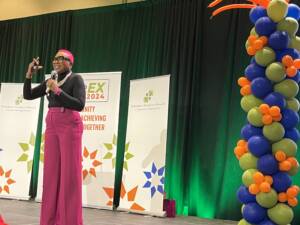
- In organizations and communities, differences make a difference.
- Just because we have differences, does not mean those differences feel welcome, heard, and included. Diversity is where we count people; inclusion is where the people count.
- If you don’t have a shared meaning in what the words mean – diversity, equity, inclusion, equality – then you cannot create a culture where you can talk about differences.
- Intercultural competence is not about agreement – it’s about understanding. It’s about having the capacity to accurately shift and adapt to cultural commonalities and differences with greater levels of complexity. According to research at the University of Phoenix, it is the fourth most important leadership skill for the future.
- Differences by themselves don’t create anything – it’s how we choose to engage across those differences that either creates conflict or community, teamwork or tension. Differences mean nothing unless they are recognized, appreciated, and leveraged. Leaders must create a psychologically safe space to talk about differences.
- Most organizations recruit for diversity, but onboard for assimilation.
- There are five key intercultural skills required for success today:
- Cultural self-awareness
- Empathy
- Tolerance for ambiguity
- Authentic curiosity
- Cognitive flexibility
- There are five stages of intercultural development:
- Denial – misses differences
- Polarization – judges differences
- Minimization – deemphasizes differences
- Acceptance – deeply understands differences
- Adaptation – bridges differences
Insights from Breakouts – 10 Powerful Sessions, Focusing on Leadership, Change, Customer Focus, Artificial Intelligence, DEI, and Other Topics:
- Satisfied employees lead to satisfied customers. – Kathy Pykkonen
- Gallup found that it is more stressful, more taxing for an employee to work for a bad boss than not to work at all. – Michelle Nelson
- Everyone has biases; everyone carries burdens. Understand and check yours; recognize and appreciate others. – Sandra Ogunremi
- If you do not know your customers are dissatisfied, you cannot fix the problem. – Pykkonen
- Commit to THINK before speaking…
- T: is it True?
- H: is it Helpful?
- I: is it Inspiring?
- N: is it Necessary?
- K: is it Kind? If it doesn’t satisfy all five of these tests, then maybe say it a different way. – Ogunremi
- Focusing on your strengths will advance your success three to four times faster than trying to correct a weakness. – Nelson
- The words we speak matter: be very careful what you say, because the message stays with people. – Ogunremi
- There are five secret ingredients for great customer service: service culture training; daily shift briefs; real-time recognition; customer loyalty survey programs; all employee bonus programs. – Pykkonen
- If you want your team to be innovative and creative, they need to take risks and be free to make mistakes. – Nelson
- Humans are creators by nature. In many ways, AI is our attempt to replicate our own intelligence. – Matt Redlon
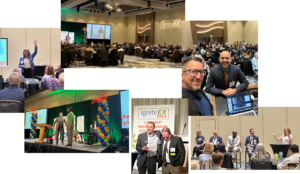 Change – and more and more often, transformational change – is becoming a regular part of success. Disruption is happening all the time. We cannot run from it. Rather, we must be prepared for is, run into it, and find (or create) valuable opportunities from it. – Bob Fangmeyer
Change – and more and more often, transformational change – is becoming a regular part of success. Disruption is happening all the time. We cannot run from it. Rather, we must be prepared for is, run into it, and find (or create) valuable opportunities from it. – Bob Fangmeyer- Five essentials of workplace wellbeing per the US Surgeon General: 1) protection from harm, 2) connection & community, work-life harmony, 4) mattering at work, and 5) opportunity for growth. – Nelson
- Community resilience requires effective communication, alignment, and an integrated strategy across different entities in the community. – Stephanie Norling
- To address the staffing shortage, it’s not just recruiting and retention – we need to reimagine our work. – Penny Bellville
- The key to making successful change is simplicity, agility, and pace. – Bill Lloyd
- Resilience is more than “bouncing back” – it’s about “bouncing forward.” – Fangmeyer
- During periods of intense change, identify what needs to remain constant. – Marshall Smith
- To increase the pipeline of talent, try new things such as internships, partnerships with high schools, an apprenticeship program, job shadowing. – Bellville
- While change can be hard, it’s not always bad. – Fangmeyer
- Good leaders develop good leaders. – Lloyd
- Leaders need to trust their employees to make good decisions. – Smith
- The most successful leaders – and most successful organizations – stay focused on their priorities. – Mara Stelzer
- The pandemic compelled many leaders to change their leadership style – today, leaders need to delegate more, trust more, and create a culture of fast action. – Chace Anderson
- We have put an equity lens on our strategic plan, our policies, our pay scales and performance evaluations. You can only achieve true equity and inclusion by hardwiring it into your systems. – Smith
- To improve your own leadership, look at other successful leaders to see what they are doing. Also, ask your team how you can be more effective. – Stelzer
- In managing change, oftentimes it’s not about the toolkit. You need the tools, but you need to be flexible and combine or customize tools to fit the circumstances. – Karly Hall
- Communication is critical for successful change. Part of that is having the right messaging, but equally important is listening to stakeholders to gauge how the change is going. – Stacey Mueller
- Every leader needs to be a change practitioner, and change needs to be embedded in every role within the organization. – Tara Tierney
- Part of making successful organizational change is having grace, understanding your people, and supporting them through the process. – Hall
- In life, we have ceremony to mark major changes (graduations, weddings, funerals). We need the same practice for organizational change – ways to honor the past and prepare for the future. – Mueller
- Regulations are intended to ensure compliance, while Baldrige is intended to help improve processes and outcomes. – Terra Carey
- To achieve excellence, you absolutely need senior leader buy-in and participation. – Jen Houtman
- We often think that change is hard, but when you think about it: we’re really adaptable when we choose to change (getting married; moving; changing jobs). It comes down to how voice do I have in the decision making, how am I included in the change, and how does it impact me personally. – Mueller
- Baldrige is about organizational and personal learning. – Tom Henry
- For us to achieve consistently good results, we needed continual improvement, a systems perspective, and integration through a culture of collaboration. – Denise Wood
- As a leader, when you think you’ve communicated enough, you’ve probably only just begun. – Klint Willert
- To achieve success, you must identify your purpose. For decades, education was set up for competition, not collaboration. – Kaleem Caire
Insights from Opening Keynote, Anne Bonney of Different Shoe Enterprises:
- When a change is announced, research shows that:
- 20% of employees will embrace it,
- 50% are on the fence, and
- 30% will resist it.
- Resistance to change is normal. But change is inevitable. So it’s not about waiting for the storm to pass, but learning to dance in the rain.
- To get through change, learn to talk to yourself rather than listen to yourself. The voice of doubt will always be there – learn to actively overcome it. Identify what you can control and let the rest go.
- When facing change, the goal is to move from the comfort zone through the discomfort zone to a new comfort zone. You can do it with a three-step process:
- Stop for a second & acknowledge your resistance to the change.
- Make a plan – a path forward, while questioning your assumptions (because what worked yesterday may not work today).
- Take action – do something. For those who attended the conference, “punch it, Margaret.”
 The American Bison turns and walks into the storm, because they know they can get through the storm quicker. Face change head on.
The American Bison turns and walks into the storm, because they know they can get through the storm quicker. Face change head on.- When you stay in your comfort zone, you’re not learning anything new. But if you get out of your comfort zone, you start learning, which increases your confidence, your competences, and your self-efficacy – which is your belief that you can do something to make things better.
- When facing a change, focus on what can go right – what can go well.
- Navigating through change requires dance partners – it’s easier than going it alone.
*********
I hope there were a few nuggets in those quotes to inspire some reflection — maybe even ignite some action. If you want to dive deeper, check out the conference on demand by clicking here! The conference was full of insights, tips, tools, and best practices to help improve leadership & personal performance, organizational and community outcomes! Go forth and EXplore, EXecute, and EXcel!
What other insights/tips do you have for performance excellence? Participate in a discussion on this topic: visit our LinkedIn group to post a comment (and follow me on Twitter @LassiterBrian!).
Never stop improving!
Brian S. Lassiter
President, Performance Excellence Network
www.performanceexcellencenetwork.org
http://twitter.com/LassiterBrian
A Catalyst for Success Since 1987!
Photo credit Lassiter & igniteEX 2024 Conference Planning Team
